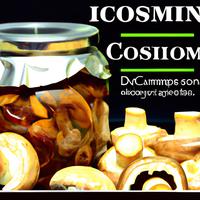
1 serving (100 grams) contains 25 calories, 2.5 grams of protein, 0.5 grams of fat, and 3.6 grams of carbohydrates.

Log this food in SnapCalorie

Nutrition Information
Calories |
59.5 | ||
|---|---|---|---|
% Daily Value* |
|||
| Total Fat | 1.2 g | 1% | |
| Saturated Fat | 0.2 g | 1% | |
| Polyunsaturated Fat | 0 g | ||
| Cholesterol | 0 mg | 0% | |
| Sodium | 476.2 mg | 20% | |
| Total Carbohydrates | 8.6 g | 3% | |
| Dietary Fiber | 3.6 g | 12% | |
| Sugars | 2.9 g | ||
| protein | 6.0 g | 12% | |
| Vitamin D | 16.7 mcg | 83% | |
| Calcium | 35.7 mg | 2% | |
| Iron | 1.2 mg | 6% | |
| Potassium | 714.3 mg | 15% | |
* Percent Daily Values are based on a 2,000 calorie diet. Your daily values may be higher or lower depending on your calorie needs.
Food Attributes
Source of Calories
About Can of mushrooms
A can of mushrooms is a convenient way to enjoy mushrooms year-round, offering pre-sliced, preserved fungi ready for use in a variety of recipes. Typically containing button or cremini mushrooms, they are packed in water or brine and may include added salt for preservation. Mushrooms, regardless of preservation method, are low in calories, fat-free, and a source of important nutrients like selenium, potassium, and B vitamins. Their umami flavor makes them popular in cuisines worldwide, particularly in soups, sauces, pasta dishes, and stir-fries. While canned mushrooms retain many nutrients, they may have higher sodium levels compared to fresh mushrooms, so checking the label is crucial for those monitoring salt intake. They provide a quick, shelf-stable alternative to fresh mushrooms, supporting heart health and immunity when consumed as part of a balanced diet. For optimal health benefits, choose varieties with minimal additives or opt for low-sodium options.



